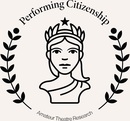Performing Citizenship
Social and Political Agency in Non-Professional Theatre Practice (1780-1850) (ERC 2022-26)
This project proposes the thesis that between 1780 and 1850 amateur theatre played a significant role in the formation of a modern concept of citizenship. Around the social activities enacted and the texts performed a broad-based movement emerged that, arguably, had a more significant impact than professional theatre which has hitherto been the almost exclusive focus of theatre historiography.
This will be the first historiographical research project to study the function of European amateur theatre in Germany, France, Britain, Sweden and Switzerland and their respective impacts on the education and the formation of the modern subject as a ‘citizen’. The concept of ‘citizenship’ was promoted by Enlightenment thinkers and was politically realized following the American and French revolutions. Around 1800, in a time of seismic political change and social shifts, non-professional theatre offered huge educative possibilities for the acquisition of skills and competences that were deemed essential to becoming a ‘good citizen’ . These educative, social and artistic practices served to embed the available concepts of citizenship in people’s lives and thus contributing to a lived and directly experienced citizen identity. Originating in elite private circles, amateur theatricals were soon adopted by the emerging middle classes and were taken up by the working classes. Non-professional theatre practices and the social activities surrounding them, opened possibilities for less privileged social groups to develop and perform their citizen identity; particularly women were intrigued by the possibilities offered to them to act out their political, social and creative agency.
A special focus will be on the pre- and post-performance activities that play an important role in amateur and non-professional theatre practices, allowing for an integral concept of theatre as a cultural and social event. Reports on rehearsals, social gatherings, evaluation of performances, organisation and administration, negotiations on permits and legal action, give insight into the dynamics and processes at play in amateur and non-professional theatre structures and their effects on the community- and identity-building.
Project website
https://www.p-citizens.gwi.uni-muenchen.de/
Project leader
Prof. Dr. Meike Wagner
Team
Dr. David Coates, Dr. Maria Gullstam, Julia Stina Skoglund, Katrin Frühinsfeld
Contact
Location:
Amalienstraße 83
80799 Munich, Germany
Postal Address:
ERC Project "Performing Citizenship"
LMU Munich
Institute for Theatre Studies
Prof. Dr. Meike Wagner
Georgenstraße 11
80799 Munich, Germany
performingcitizenship@lmu.de
Funding

